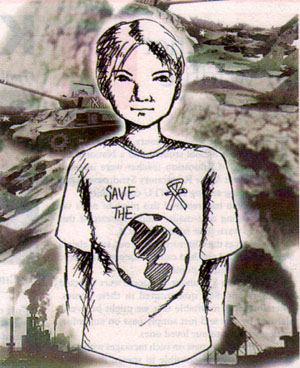
| The personal is the political: a manifesto for activism |

|
You don’t have to be a politician to be political. You don’t have to be a card-carrying member of the civil society elite or a placard-toting activist either. Being political is, simply put, an awareness of issues and events that affect our world, and having a response to that. It means, for lack of a better definition, giving a damn about what is happening around you. Being political is not something that happens once every four years when you put a ballot slip into a box. Politics is here and now. It is responding to what happens to you in school, work, and at home. “The personal is the political”, so went a slogan from the 1980s feminist movement. That idea has lost none of its potency nowadays, the site of political struggle is not between democracy and communism, not incumbent and opposition parties, but within the self. It is the individual who is the political voice. It was not just the civil society groups such as The Nature Society that saved Chek Jawa from redevelopment, but also all the families that went down to Pulau Ubin during the weekends that convinced the Urban Renewal Authority just how valuable this piece of unspoilt ecology was. Not only did members of the public provided new information on the area’s biodiversity, they partnered with the Government to come up with alternative reclamation profiles for Pulau Ubin that would not harm Chek Jawa’s habitats. Although it was the Think Centre that initiated an online anti-war petition recently, it was the 800 people who signed it who showed that the anti-war movement in Singapore does not consist of just six people. These are some of the examples in which not just the civil society, but a group of individuals with a common interest registering its political will. And there are a host of causes to which one can ascribe to: environment, conservation, anti-war, anti-globalisation, anti-racism, vegetarianism, animal rights, feminism, domestic violence, the handicapped, community service, organ donation, online privacy, breast feeding, and patriotism. Believing that the individual has no political voice is probably the biggest disservice you can do to yourself. You don’t need to be part of the traditional political infrastructure to be heard. You don‘t have to change a law in order to say you have made a difference. Even getting your lunch buddies to economise on styrofoam use is a political act. Being political has no tangible benefits. It won’t get you good grades, won‘t get you rich or popular. You might draw a bit of unnecessary attention for your beliefs, but that’s about it. If everyone looked at being political in terms of a cost-benefit analysis, no one would become political. Activism arises out of a sense of justice, out of a realisation that there is something deeply wrong with the world we live in, and in the hope that the individual can perhaps do his part. The world is a better place for having people who believe in something; it is a far better course of action than nihilism. Words by Jared Tham. Graphic by Fu Shi Han. Published in The Nanyang Chronicle, March 31 2003. |